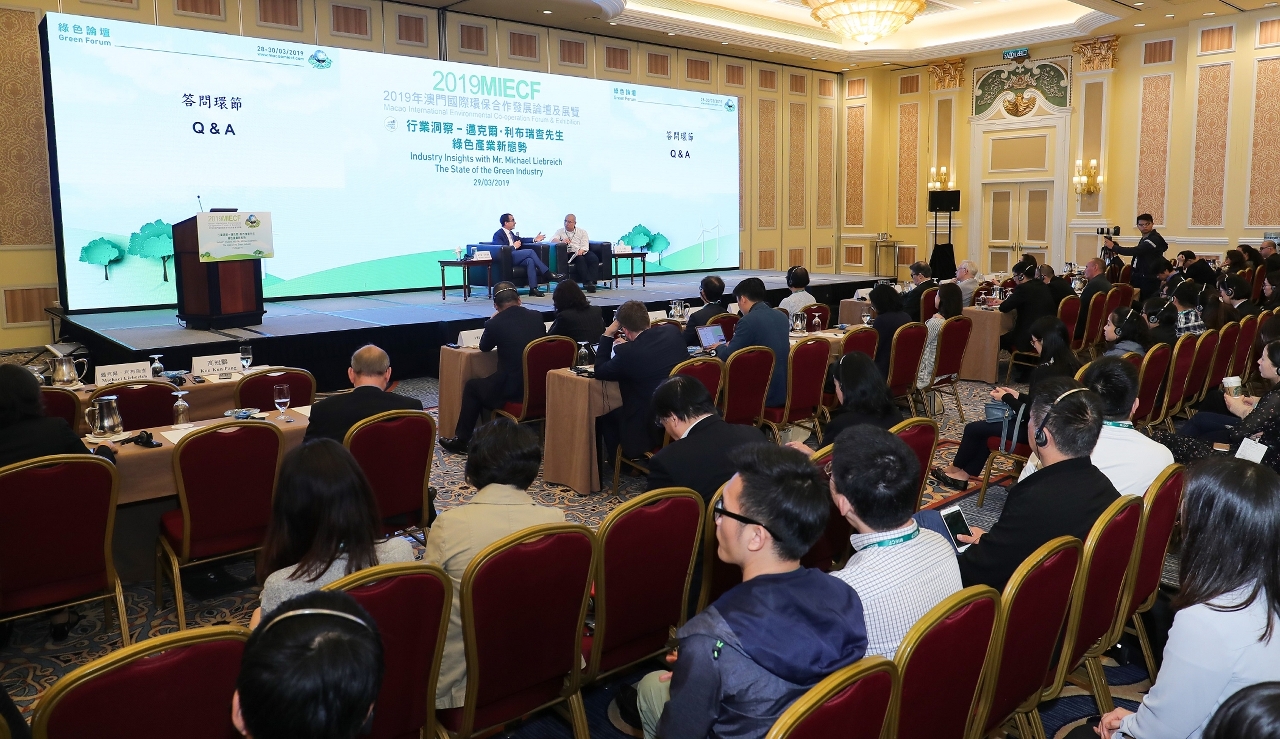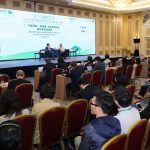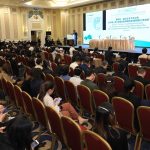 Mr. Michael Liebreich exchanges views with the audience
Mr. Michael Liebreich exchanges views with the audience
The “2019 Macao International Environmental Co-operation Forum and Exhibition” (2019MIECF) held the highlighted Day Two of the Green Forums today, March 29, which included a total of five Sessions and a Keynote Speaker Special Session. The most discussed issues have been concerning ecological civilization, green finance, water resources, and marine pollution.
This year, the organizer continues the co-organized forum with the Hong Kong and Macao Affairs Office of the Ministry of Ecology and Environment of the People’s Republic of China - “Session 4: The Ways Toward Ecological Civilization”, which focuses on how society could benefit from ecologically civilized actions taken for sustainable and green development. Mr. Cao Jinqing, Director of the General administrative Office of the Ministry of Ecology and Environment of the People’s Republic of China, delivered a keynote speech on the topic of “Learning and Implications from the Ecological-Protection Philosophy of Chancellor Guangzhong of the Ancient state of Qi”. Mr. Cao suggested that Guanzhong’s ecological philosophy was a detailed exposition of plant ecology and growth and had beneficial implications for later generations.
He said that Guanzhong’s ecological-protection philosophy is based on practice. His philosophy, which aims to carry out reasonable and effective protection measures according to local conditions after discovering and investigating the ecological environment and resources, has a profound impact on today's society. He also said that the important exposition made by President Xi Jinping at the International Ecological Conference can be combined with Guanzhong's ecological civilization philosophy, to indicate a number of practical goals for the construction of ecological civilization today.
In addition, guests at this session shared successful experience through case studies to illustrate how governments, enterprises, and the public sector could work closely together to make different stakeholders aware of the importance of ecological priority. Xing Changcheng, Deputy Director of the Central Supervision Office of Ecological and Environmental Protection of the Ministry of Ecology and Environment; Li Weizhen, Director of the Department of Water Ecology and Environment of the Ministry of Ecology and Environment; and Sun Shaofeng, Deputy Director of the Department of Solid Wastes and Chemicals of the Ministry of Ecology and Environment, respectively introduced the implementation of supervision on environmental protection, policies of ecological environment management, and environmental management of solid waste in the Mainland, as well as the results thereof.
“Session 5: Leveraging the Macao Platform, Fostering Green Finance to Promote the Development in the Greater Bay Area”, co-organized with the Monetary Authority of Macao, was divided into two parts: “Macro environment and development potentials of green finance” and “Innovative instruments of green finance”. During the session, Mo Wangui, Deputy Director of the Institute of Financial Research of People’s Bank of China, pointed out that since 2012, China has attached great importance to the green development of ecological civilization construction and put forward five concepts of innovation, coordination, green development, openness, and sharing, among which green finance has played a major role.
During “Session 6: Solutions for Green Development – Clean Water”, Zhang Yingjian, Deputy Director of the Beijing Municipal Ecological Environment Bureau, said that water management is a long-term and phased work that needs constant maintenance. The experience of the Mainland suggests that the effect of using ecological methods to solve ecological problems is obvious. Combined with the construction of laws and regulations, and the intensified collection and treatment of urban domestic sewage, the water environment can be improved.
At “Session 7: Green Chemical Forum-Solutions to Tackle Plastics Marine Debris”, participants pointed out that ecological civilization construction was an important part of social development. In the process of promoting economic development, it is necessary to comprehensively establish a comprehensive, green and low-carbon recycling development model to support the construction of ecological civilization. The environment cannot be compromised for economic development, nor the laws of economic and social development can be compromised for environmental conservation.
In addition, Mr. Michael Liebreich, the 2019MIECF keynote speaker, held a special session on the afternoon of this day titled “The State of the Green Industry”. This special session provided a more interactive setting for the speaker and participants, creating a spirited atmosphere. According to Mr. Liebreich, with the decreasing production technology costs of renewable energy such as wind and solar power lower, the use of renewable energy can be mainstreamed globally. He suggests economic growth and green development are not mutually exclusive, but this will depend on how the concept of economic growth is redefined to make it more relevant to the well-being of society.
Mr. Liebreich also suggested that as Macao has developed tourism and hotels, it could promote high-efficient energy-saving or low-carbon buildings through policies. As an international business platform, Macao could also leverage its role as a link between Portuguese-speaking countries and the Greater Bay Area to strengthen the collaboration of green development in technology and financing and explore business opportunities to lead the green market.



